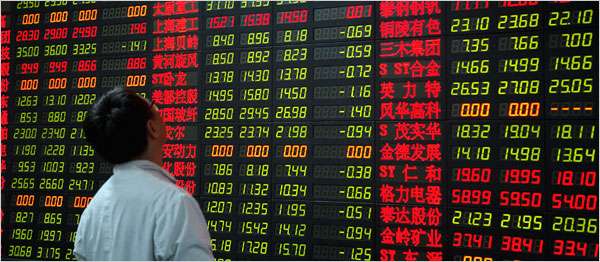Asian shares fell for a second day as investors assessed a mixed batch of earnings reports and oil held near a three-week low. The dollar strengthened versus most peers and bonds fell amid growing confidence that the Federal Reserve will raise interest rates this year.
The MSCI Asia Pacific Index extended the last session’s retreat from a two-week high, led by declines in energy shares. Canon Inc., Cnooc Ltd. and Posco all fell after announcing results, while Samsung Electronics Co. rose. The Bloomberg Dollar Spot Index climbed to a seven-month high and U.S. Treasuries extended losses after American data on Wednesday showed pickups in new home sales and services activity. Crude oil traded below $50 a barrel amid doubts that OPEC will implement its first output cuts in eight years.

While almost 80 percent of S&P 500 Index companies to have reported earnings so far this month beat analysts’ estimates, positive surprises have been less common in Asia and Europe. Investors are also erring on the side of caution as they assess the likely trajectory of U.S. interest-rate hikes and the outcome of the American presidential election, with a Fed policy meeting and the vote both due in the next two weeks.
The U.S. is due to release updates on durable goods orders and the housing market on Thursday, while the U.K. has gross domestic product figures that will shed light on how the economy performed in the wake of the Brexit referendum. Companies reporting earnings include Google parent Alphabet Inc., Deutsche Bank AG and China Petroleum & Chemical Corp.
Stocks
The MSCI Asia Pacific Index was down 0.7 percent as of 1:39 p.m. Tokyo time, with a gauge of energy shares sliding 1.3 percent. Hong Kong’s Hang Seng Index led losses among regional benchmarks with a 1.2 percent decline, while Japan’s Topix index retreated from its highest close since April.
Futures on the S&P 500 Index fell 0.1 percent after the underlying benchmark retreated 0.2 percent on Wednesday. Contracts on the U.K.’s FTSE 100 Index lost 0.4 percent.
Currencies
The Bloomberg Dollar Spot Index added less than 0.1 percent. It gained 0.2 percent in the last session as a purchasing managers’ index indicated the U.S. services sector is expanding at a faster pace than economists forecast and data showed new home sales in September were close to the highest level in almost nine years.
While traders see a less than one-in-five chance the Fed will raise rates at its Nov. 1-2 meeting, they are pricing in about 73 percent odds of a December move, futures prices show. That’s up five percentage points this week.
“The U.S. housing sales and PMI overnight are really supportive for the dollar,” said Stephen Innes, a senior trader at Oanda Asia Pacific Pte in Singapore. “We’re almost 75 percent priced in for the Fed rate hike so I’m really thinking that further dollar traction based on Fed rate hike expectations is quite limited. The market positioning is quite long right now.”
The yen was little changed at 104.49 per dollar, near a three-month low. The overwhelming majority of economists surveyed by Bloomberg News expect the Bank of Japan to keep stimulus unchanged when Governor Haruhiko Kuroda and the policy board meet Oct. 31-Nov. 1 to assess the progress of their new yield-control framework.
South Korea’s won weakened 0.7 percent and Mexico’s peso dropped 0.5 percent, the biggest losses among major currencies.
Commodities
Crude oil was little changed at $49.24 a barrel in New York, after sliding 1.6 percent on Wednesday as data showed a pickup in U.S. production. Organization of Petroleum Exporting Countries officials will meet this week to try to resolve differences over how much individual members should pump once planned output reductions are in force, with Iraq among the list of countries saying it should be exempt from the cuts. The proposed limits will be put to the group for approval at a meeting next month in Vienna.
“The oil market hasn’t transitioned from a buyers market to a sellers market just yet,” said Jonathan Barratt, chief investment officer at Ayers Alliance Securities in Sydney. “It’s still in a range and it’s likely to hold near here as we head toward the November OPEC meeting.”
Copper, aluminum, nickel and tin all declined for the first time this week as a reportshowed profit growth at Chinese industrial companies moderated to 7.7 percent in September, following a 19.5 percent jump in August that was the biggest jump in three years.
Bonds
The yield on U.S. Treasuries due in a decade increased by one basis point to 1.81 percent ahead of an auction of seven-year notes, matching its highest level since June and exceeding the median year-end projection of 1.75 percent in a Bloomberg survey. Sovereign debt in the world’s biggest economy is saddling investors with losses for a third month as inflation expectations build and speculation mounts that a Fed rate rise is coming.
“A rate hike is already implied in the market,” said Hideo Shimomura, the chief fund investor at Mitsubishi UFJ Kokusai Asset Management, which oversees about $115 billion. “Now it’s a good time to buy. I don’t fear an inflation risk in the U.S.”
New Zealand’s 10-year bonds fell, pushing their yield up by five basis points to 2.68 percent, the highest since May. Similar-maturity notes also retreated in Australia, Singapore and South Korea.










Add comment